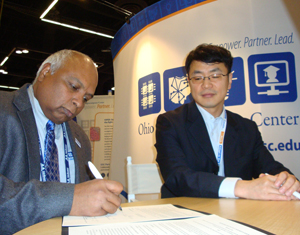Two well-respected technology organizations, located on opposite sides of the Earth, are joining forces to boost the economic competitiveness of their industrial client-partners by offering enhanced combinations of high performance computational hardware, software, training and expertise.
Officials from the Korea Institute of Science and Technology Information (KISTI) Supercomputing Center and the Ohio Supercomputer Center (OSC) signed a collaboration agreement in Portland, Ore., Monday night at SC09, the international conference of high performance computing, networking, storage and analysis. The agreement is designed to enhance the offerings of both organizations' industrial outreach programs, OSC's Blue Collar Computing and KISTI's Small and Medium Business Supercomputing.
"This sort of strategic international partnership enhances Ohio's reputation as a wellspring for innovation, discovery and leading-edge business growth," said Lisa Patt-McDaniel, director of the Ohio Department of Development. "These high-tech organizations deserve commendation for their efforts to enhance the business and manufacturing environments in Ohio and Korea."
KISTI's Small and Medium Business Supercomputing (SMB Supercomputing) program partners with companies to apply high performance computing to real-world problems faced by industry. The program provides resources and technical support to university and institute researchers to solve industrial problems.
"To maximize the value to customers, KISTI is developing local and foreign information resources, strategic information analysis, supercomputing and advanced information infrastructure," said Dr. Jysoo Lee, director of the KISTI Supercomputing Center.
OSC's Blue Collar Computing (BCC) program supplies computational modeling and simulation solutions to small and midsize companies without requiring the large up-front investment needed to invest in HPC resources. The BCC model is service-oriented, relying on amortizing the cost of expertise, software and hardware across many firms to reduce individual expenditures.
"OSC already has staff working on Blue Collar Computing programs stateside, and this key partnership will significantly expand OSC's interaction with the international community," said Ashok Krishnamurthy, interim co-executive director of OSC.
The KISTI-OSC agreement outlines several specific activities:
- Jointly developing web-portal based modeling and simulation software
- Sharing experiences of licensing and usage issues with commercial software vendors
- Providing expertise on the selection and deployment of open-source software codes
- Hosting each other's staff members for temporary assignments
- Coordinating participation in workshops, conferences and forums to promote these industrial outreach programs
Under these business development programs, advanced computational technologies provide companies with innovative tools that allow for the virtual development of new and improved products, such as cars, pharmaceuticals and financial products. Virtual modeling and simulation provide companies with a competitive edge through improved manufacturing processes that can reduce the time, labor and cost needed to bring products to market. Simulation makes choosing between alternative processing methods far easier, better analysis and documentation of capabilities help with efficiency, and improved factory and workflow layouts increase productivity.
